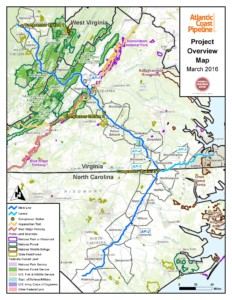Duke Energy and Dominion Energy have just hit a major roadblock in their progress of building a massive 600-mile pipeline through the heart of North Carolina.
The pipeline would start in the fracking fields of West Virginia, wind through Virginia and North Carolina, and end at the bottom of our state. It would collect natural gas from several stations along the route, and distribute it across the 3 states.
 The energy partnership claims the pipeline would add, “17,000 new jobs, $377 million in annual energy cost savings, $28 million in new local tax revenue and the revitalization of the region’s manufacturing economy.”
The energy partnership claims the pipeline would add, “17,000 new jobs, $377 million in annual energy cost savings, $28 million in new local tax revenue and the revitalization of the region’s manufacturing economy.”
Since its initial announcement, however, it’s faced continued opposition from environmental groups, community organizations, and government regulators alike.
This past Friday, all work on the pipeline came to an abrupt halt when The U.S. Court of Appeals suspended the federal permits due to the path of the pipeline traveling through the habitats of 4 separate endangered species: a bee, a bat, a mussel and a crustacean.
Several environmental group’s submit legal briefs claiming that pipeline construction will harm the endangered species in a number of ways. The clubshell mussel would be buried alive by dredging and grading. Digging and blasting could crush or trap the Madison cave isopod. The rusty-patched bumblebee would be injured and/or killed by tree felling. And tree clearing would force pregnant female bats to change their flight routes, exposing them to predators.
While the bat’s habitat covers the greatest along the pipeline’s path, the endangered bumble bee is in the most precarious position of the affected species.
“RPBB is on the brink of extinction,” according to the environmental legal brief. “Its populations have have plummeted 88 percent since the 1990s.”
Duke Energy will now have to prove that they will take the necessary measures to protect the endangered species before they are able to continue.


